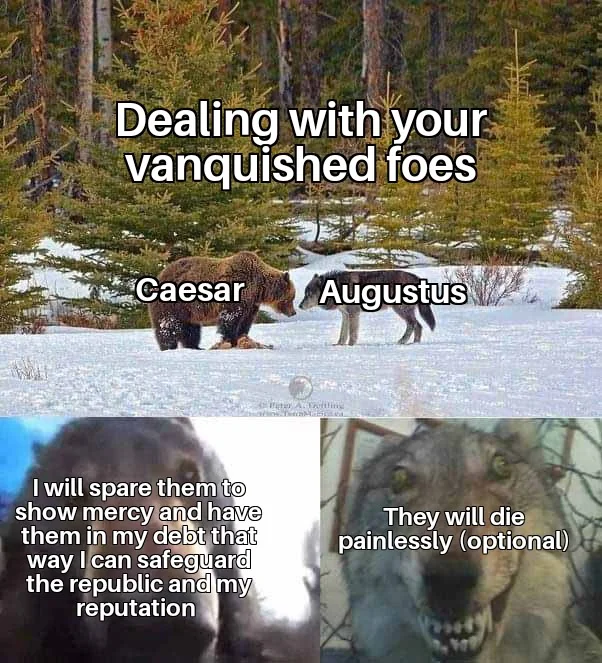this post was submitted on 19 Jul 2025
156 points (98.8% liked)
A Comm for Historymemes
3110 readers
913 users here now
A place to share history memes!
Rules:
-
No sexism, racism, homophobia, transphobia, assorted bigotry, etc.
-
No fascism, atrocity denial, etc.
-
Tag NSFW pics as NSFW.
-
Follow all Lemmy.world rules.
Banner courtesy of @setsneedtofeed@lemmy.world
founded 2 years ago
MODERATORS
you are viewing a single comment's thread
view the rest of the comments
view the rest of the comments

They got... different reforms. Augustus's solution was to distribute provincial land (funded by taxes on inheritances and slave sales) to retiring troops after set (long) enlistment periods, which merged the broader issue of land reform and veteran benefits, both of which were key to the political unrest of the Late Republic. The Senate, in the short-term, didn't have to share its power with the dreaded poors - in fact, the Popular Assemblies were almost entirely neutered, which was a key demand of the ultraconservatives in the Senate during the Late Republic.
The thing is, once the Senate (effectively) gave up their power (and any who weren't keen on doing so replaced by lickspittles by Augustus), all of their prior conservative demands meant jack shit. The Senate, instead of becoming the sole instrument of power that it dreamed of, became a rubber-stamp legislature and advisory council to the Emperor, while ambitious men increasingly climbed through the ranks of the (newly permanent and professional) Legions, which significantly altered the political discussions of Rome.
With power more nakedly in the hands of the men with swords, and those same men being settled largely in colonies in the provinces, the political discussion turned from land reform for Italian magnates, to broader issues of provincial inclusion in the Roman polity. Coincidentally, this also happened as the Roman Empire became increasingly urbanized (not just in the city of Rome itself) and wage labor and mercantile endeavors began to develop as a serious alternative to subsistence farming in many areas, along with a drop in the birth rates of Roman citizens, all of which also reduced pressure for land reform.
The aristocracy continued to be a problem, but a much reduced one for the next ~300 years of the Empire, since the levers of power and wealth were funneled to new, rising bureaucratic and mercantile classes, and the traditional land magnates were increasingly marginalized - especially since they no longer actually had the power to obstruct or construct legislation in their favor to enhance their wealth and power. This despite essentially getting all but one (supremacy of the Senate) of their core demands of Late Republic politics fulfilled. Funny how that works. All the policy successes in the world mean nothing without the power base that causes them.
Unfortunately, as the Empire fell apart in the Crisis of the Third Century and became increasingly rural and demonetized, and the central government weakened, land became the core of economic power again, and so the fundamentally unresolved issue of aristocratic land ownership allowed the aristocracy to reclaim massive political power and reduce the common folk of the Empire to a debased state of borderline slavery until the Empire fell entirely.
Very interesting read, you seem to know a lot about the subject! I'm curious about the last paragraph and wondered if you could elaborate? Especially about the gradual decline of life of the common folk, how that looked like until the collapse of the Empire. I don't know much about the subject in general
Saving myself the rewrite, I actually made a comment about this very subject a few months ago! You might find it interesting:
Thanks❤️ wow what a read! Very interesting and sad to read. They really shot themselves in the foot and ruined something that everyone benefited from. I'm just thinking about how these were regular people and how it was to be in the midst of all these bad political choices and suddenly find yourself binded to coloni, and gradually losing your rights and freedom and quality of life. I would try to escape for sure
AH! ONE OF THE BAUGADAE! YES, EMPEROR, THIS BANDIT RIGHT HERE
With all seriousness, many invading barbarian tribes of this period swelled their ranks with dissatisfied Roman peasants escaping the position of coloni, for exactly the reason that they were utterly intolerable conditions.
Crazy how even successful societies dismantle themselves when the powerful are left unrestrained.